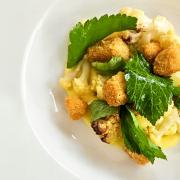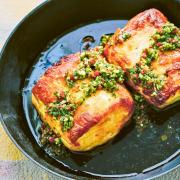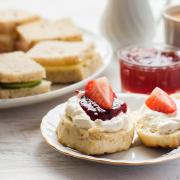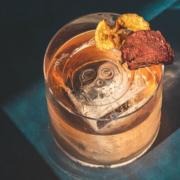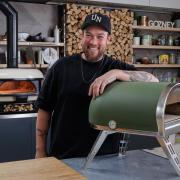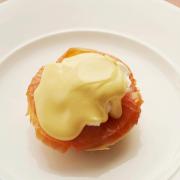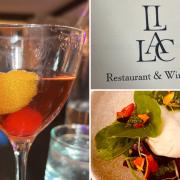Melissa Thompson’s debut cookbook is a love letter to the food of Jamaica and the people who created it over generations, but she has never forgotten her Dorset roots
When I call Melissa Thompson from my mobile to say I’m ridiculously early, she immediately invites me for lunch as she’s doing some recipe testing. Meaning that, as I walk up the leafy South London hill to her house, I’m kicking myself for having eaten already. And sure enough, my tastebuds tingle with excitement when I smell the delicious aromas filling her beautiful kitchen, where a skylight above the cooker offers a panoramic view of skies and trees that change with the seasons.
Though born in Dorset, Thompson has lived in London for most of two decades, having originally come to the capital to study Business Management before switching to journalism. ‘I met an Australian student who told me I could do a degree in it. At the interview they asked me which paper I read. “The Daily Mail,” I said, as that’s what my parents read.’ Before that, up to the age of 11 she’d lived in both Hong Kong and Weymouth, at which point she went to a military boarding school in Suffolk.

Her parents are both keen cooks. ‘Mum would do most of the weekday cooking, then Dad would cook at the weekend. Like me, he’s an intuitive cook, although he’ll follow a recipe the first time.’ As we chat, she is constantly tasting and adjusting the rice dish she’s making. ‘Dad is good at eating something and knowing what’s gone into it. Having grown up in Jamaica, then being in the Navy, he cooks food from all over the world. As a child he’d never let me help in the kitchen, but I learnt a lot just from watching him.’ For Thompson and her older brother, Lee, food was a language of love as they were growing up. ‘From plates of curry chicken waiting for us after a night out, to the lasagne we’d be sent on our way with when we left home.’
At the beginning of her career, she was a feature writer and spent four years working on the Dorset Echo. ‘I loved the freedom of working there. It was before sat nav, so I’d just drive around the county with a print-out from the AA route mapper – always late for everything. My favourite feature was when I visited an abattoir and watched the whole process. Afterwards, driving home, seeing cows in the fields, then eating ragu made me quite emotional, and I’m very proud of the piece I wrote.’

As a teenager, Thompson worked at The Fridge, a deli in Dorchester, where she developed further respect for food production. ‘All that goes into making things like bacon, brawn, paté and cheese. The roughness of the skin, its saltiness; I grew to understand why certain cheeses had strong flavours or mould running through them.’
She started applying for jobs in London as a food journalist, but it was the Press Association then The Mirror that she went to next, again as a general feature writer. However, food remained her passion and in 2014 she started hosting supper clubs in the front room of her South London home. Having been inspired by her sister-in-law, Aya’s kara-age fried chicken, her theme was Japanese comfort food.
‘The first supper club was just for friends and family. For the second, I hosted 12 strangers, then it became 16. At the time it was something quite different for South London and my menu expanded to include things like miso-smoked short ribs.’
Next, she started doing pop-ups, then residences in pubs (sometimes four nights, then seven nights a week for two months).
‘I became well-known enough that I was asked to write a book about Japanese comfort food, but I didn’t feel it was my place to do so. I wasn’t particularly nervous of cultural appropriation (she’s of Jamaican and Maltese heritage) but, although I’d done my research and knew where my food sat within Japanese culture, I didn’t feel I was immersed enough in it.’
By this time Thompson was pregnant with her daughter, and her partner, Kate (a haematologist) suggested she take a month off. ‘I’m often asked about my best-ever meal, and one of them was definitely the bangers and mash with onion gravy that Kate made me during my first trimester, when I hated all food. It was a meal made with love; everything about it was perfect. After that month off, I never went back to cooking full-time. I returned to writing and helping restaurants with their social media.’

For someone with such a successful career, it’s interesting that nothing has been planned. ‘I think my lack of focus comes from being reticent to put myself out there for fear of failure. My career has involved a lot of serendipity; being in the right place at the right time.’ That might be so, but it’s also her passion that’s propelled her. Ask what her favourite cuisine is and she almost implodes with the difficulty of the challenge.
‘Well, Jamaican food is up there,’ she smiles. ‘Can I have five? Jamaican, Mexican, South East Asian – but I really like Sichuan, and I’m learning a lot more about West African food, and I really like…’

By contrast, naming her favourite way to cook is easy. ‘On the barbecue. Although I’ve had to cut back as Kate was threatening to throw them all out. The kettle barbecue is my favourite, then there’s the pellet grill that’s good for smoking at low temperatures, a gas grill and an Egg.’ The latter is a kamado-style ceramic charcoal barbecue known as the Big Green Egg.
It was around the time of George Floyd that Thompson began to combine writing about food with racial politics. ‘After his murder I really struggled with my emotions. It was a horrible time and I started talking about things on social media, promoting black and ethnic minority chefs. BBC Good Food got in touch to see if I’d like to write a column, I wrote a piece about the cultural snobbery surrounding fried chicken for The Guardian, which sparked a lot of debate, and another on Black erasure in the food industry.’ All of which earned her the Guild of Food Writers’ Writing Award for 2021.
‘Then someone, who is now my agent, got in touch and asked if I’d like to write a book. I had these ideas swirling around at the time, about writing about Jamaican food and its history. The book ended up going to a five-way auction, which Bloomsbury won as they’d been so culturally sensitive during the whole process.’
The result is Motherland, an extraordinary combination of recipes and how the island’s history influences the food. ‘I love food that comes with a story,’ says Thompson. ‘And that hadn’t been done with Jamaican food. Books were mostly done in a saccharine, ‘tropical’ way, focusing on Jamaica as a party island. And I just didn’t want to do that. I’m so in awe of the brilliance and ingenuity of the African cooks, the enslaved people who managed to make excellent food, like ackee and saltfish, out of minimal ingredients.

‘Also, the story of how vegan food evolved out of the spirituality of Rastafarianism is fascinating. I think that Jamaican food is under-rated because people don’t understand it. It’s incredibly clever: the layers, the slow cooking, how dishes can have similar core ingredients, but the way they’re prepared makes them totally different.’
She’s delighted when I say that including the history of how the recipes evolved imbues the food with a sense of real depth and gravitas. ‘That’s exactly what I wanted: for people to feel invested in the food when they know where it came from.’
However, what I wasn’t expecting was such a level of brutality in a cookery book. ‘Yeah, and I had to pare it back a lot. Motherland is very personal, and by far the hardest thing I’ve ever had to write. But it’s so necessary. If you’re going to talk about the history, you can’t do that without talking about the really horrific parts. Yet there’s such a reluctance to do so; acknowledge the strength of connections - even within Dorset. I don’t necessarily want people to apologise, just fully acknowledge how horrendous it was, and how positions today are on the back of what was.’
I ask about the book’s title - Motherland. ‘I find it quite grounding. It represents the people who make the food, and how a lot of food gets written about through a yearning for your birthplace. Initially I was going to call it Fatherland, but that’s got hints of the Third Reich.’
Ah yes, her father - who still won’t let her help him cook. What does he think about the book? ‘He really likes it. My parents came to stay and I put a copy of it on their bed. When I went upstairs, I caught my mum taking photos of Dad holding it. Since then he’s been cooking from it and I’ve had no negative feedback yet.’
Surely that’s a seal of approval. And Melissa’s debut cookbook has been well received elsewhere too, named as one of BBC Radio 4’s Food Programme Books of the Year 2022, and in the top cookbooks for The Telegraph, Financial Times and The Observer. So, what’s next? ‘Well, I’m in talks about doing a television series. And I could maybe see myself writing more history books. Or cookery books. I’m just not sure I’d combine the two again!’

Motherland: A Jamaican Cookbook is published by Bloomsbury at £26. For excellent cooking tips and recipes, follow Melissa on social media @fowlmouthsfood or visit her website: fowlmouths.co.uk
Brown Stew Chicken: A classic recipe across the Caribbean, especially in Jamaica. It gets its name and colour from the browning, a mix of browned sugar and vegetable stock. This dish means comfort to me and it’s a meal I always come back to.

Serves 4
1.5kg whole chicken
1⁄2 tsp sea salt
1 tsp freshly ground black pepper
1 large onion, finely sliced
3 garlic cloves, crushed
5cm piece of ginger, finely grated
3 thyme sprigs
1 tbsp ground pimento
1 tbsp all-purpose seasoning
2 spring onions, roughly chopped
1 tbsp Savoury Browning (see below)
3 tbsp vegetable oil
1 red pepper, sliced
300ml water
2 tbsp light brown sugar
1 tbsp soy sauce
2 tbsp tomato ketchup
1 Scotch bonnet
Method: Cut the chicken into small pieces: separate the drumsticks and thighs and cut both in half using a cleaver. Divide each breast, on the bone, into 3–4 pieces. Separate the wings into the drum and flat. Remove the skin from every piece apart from the wings and freeze it, along with the wing tips and backbone, for stock.
Mix the chicken pieces in a bowl with the salt, pepper, onion, garlic, ginger, thyme, pimento, all-purpose seasoning, spring onions and Savoury Browning. Leave to marinate for at least 4 hours in the fridge, ideally overnight.
Put the oil in a Dutch pot or heavy-based pan. Scrape as much of the marinade off the chicken pieces back into the bowl as you can (reserve this) and brown the chicken on all sides, in batches if needed, so as not to overcrowd the pan.
Remove the chicken to a plate and scrape the marinade into the same pan. Cook for 10 minutes over a medium-high heat until the onion starts to colour, then add the red pepper. Mix well and return the chicken to the pan with the measured water and all the remaining ingredients. Include the Scotch bonnet whole for flavour, or finely chop 1⁄4–1⁄2 of it for heat.
Bring to the boil, then reduce to a simmer. Cook for 25 minutes until the sauce is thick, dark and glossy and the chicken is cooked through. Pick out the thyme sprigs, if you want, and the whole Scotch bonnet, if using. Serve with rice and peas, or roasted breadfruit and steamed cabbage.
Savoury Browning: Makes about 5 tablespoons. Reduce 400ml vegetable stock in a saucepan to around 100ml, takes about 30 minutes over a medium-high heat. At the same time, brown 50g of soft brown sugar - heat in a non-stick pan over a medium-high heat until it starts to liquefy (4-6 minutes), watch carefully so it doesn’t burn. Once both are ready. Stir together until there are no lumps. While hot pour into a sterilised jar, label and keep in the fridge for up to six months.

Guinness Punch Pie: If you like custard tarts, you will love this. I first had the idea for it a few years ago, while drinking some Guinness punch and wondering if it would translate into dessert form. The answer was a resounding yes. The flavours work really well in a tart, you can adjust the intensity of the Guinness flavour by using slightly less or more. And if you don’t drink alcohol, you can use 0% Guinness: it works, I’ve tried.
Stout is a popular drink in Jamaica, with Guinness and Dragon Stout cornering the market. Guinness followed the British Empire – it is also huge in Nigeria – and the company first exported a West Indian porter from Dublin to the island in 1801, with the first export of proper Guinness going out in 1830. Its long-standing history on the island is immortalised in Guinness Punch and this tart takes on those flavours beautifully. The slight bitterness of stout is softened by sweetness here, while the spices in the custard are reminiscent of the stout itself. The tart makes a brilliant centrepiece, and will bring smiles of contentment to fans of the drink, as well as to everyone else
Serves 8
For the custard
400ml Guinness
7 egg yolks (freeze the whites for another time)
405g can of condensed milk
250ml double cream
1⁄2 tsp grated nutmeg, plus more to serve 1⁄2 tsp ground cinnamon
1 tsp vanilla extract
For the pastry
125g unsalted butter, plus more for the tin 250g plain flour, plus more to dust
45g golden caster sugar
1 egg yolk
30ml water
Method: In a saucepan, simmer the Guinness until it reduces by about two-thirds. Leave to cool.
Meanwhile make the pastry. Using your hands, rub the butter and flour together until the mix resembles breadcrumbs. Mix in the sugar and egg yolk and then add the measured water a little bit at a time, until the dough comes together. Don’t knead any more, just wrap in cling film or greaseproof paper and refrigerate for 30 minutes.
Preheat the oven to 160°C/fan 140°C/Gas Mark 3. Butter a 20cm tart tin and remove the pastry from the fridge. Dust your worktop with flour and roll out the pastry into a circle roughly 28cm in diameter. Coil the pastry around the rolling pin and uncoil over the tart tin. Carefully push the pastry into the corners of the tin and leave the edges rising above the edge. Prick the base of the tin with a fork all over, then line with greaseproof paper and baking beans or rice. Bake in the oven for 15 minutes. Take out the greaseproof paper and baking beans and bake for a further 5 minutes. Remove from the oven and leave to cool.
In a bowl, gently beat the egg yolks with the condensed milk, trying not to get too much air or too many bubbles into the mix. Stir in the double cream and reduced Guinness, then stir in the remaining ingredients.
Pour the custard into the pastry case and bake for 40–45 minutes; it should still have a wobble in the middle. Remove and leave to cool. Grate extra nutmeg over the top and chill before slicing.
Recipes taken from Motherland: A Jamaican Cookbook by Melissa Thompson






